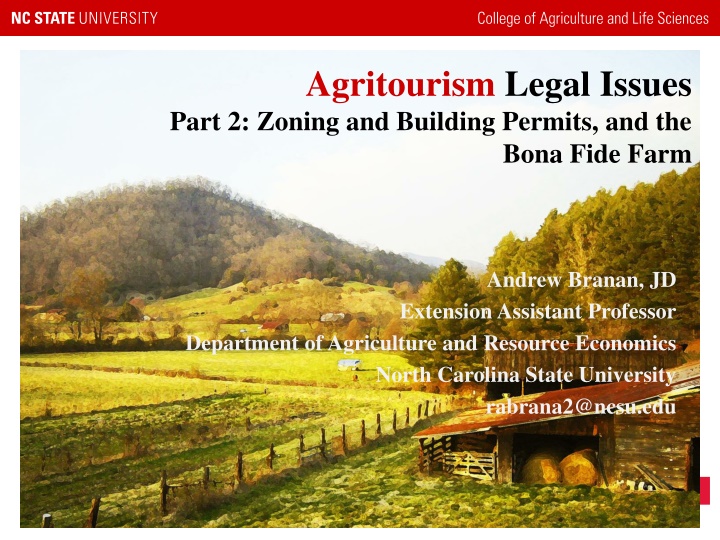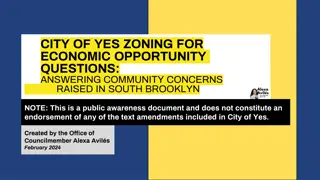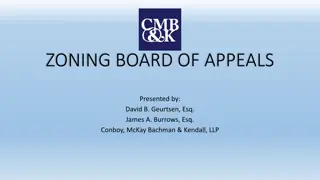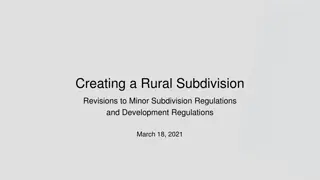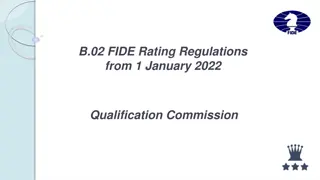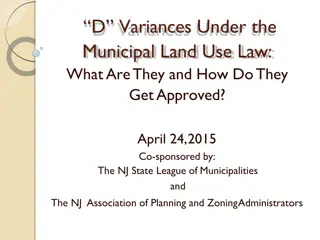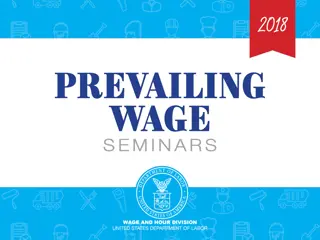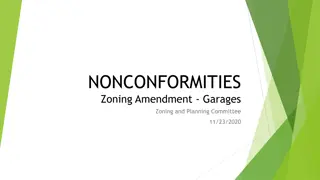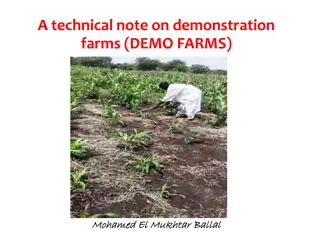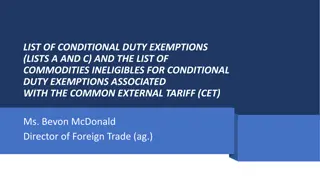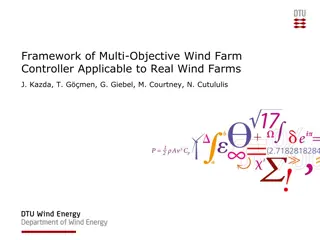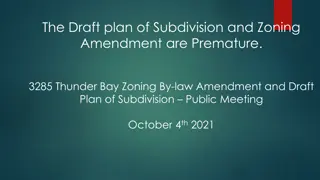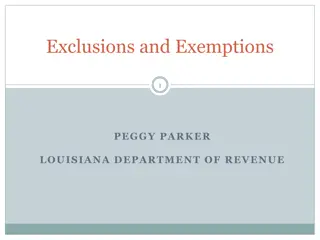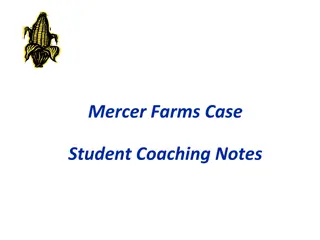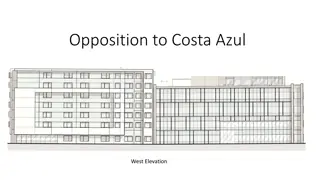Bona Fide Farms: Zoning Regulations & Exemptions
The legal aspects of bona fide farms in North Carolina, including zoning regulations, building permits, and the criteria for exemption. Learn about the requirements, implications for municipal zoning, and evidence needed to determine farm status.
Download Presentation

Please find below an Image/Link to download the presentation.
The content on the website is provided AS IS for your information and personal use only. It may not be sold, licensed, or shared on other websites without obtaining consent from the author.If you encounter any issues during the download, it is possible that the publisher has removed the file from their server.
You are allowed to download the files provided on this website for personal or commercial use, subject to the condition that they are used lawfully. All files are the property of their respective owners.
The content on the website is provided AS IS for your information and personal use only. It may not be sold, licensed, or shared on other websites without obtaining consent from the author.
E N D
Presentation Transcript
Agritourism Legal Issues Part 2: Zoning and Building Permits, and the Bona Fide Farm Andrew Branan, JD Extension Assistant Professor Department of Agriculture and Resource Economics North Carolina State University rabrana2@ncsu.edu
What is a Bona Fide Farm NC Counties are authorized to implement land use restrictions through zoning in their jurisdiction (outside of municipality) A farm that qualifies for exemption from zoning under statute The term exists only in the context of zoning It has been appropriated to denote legitimate farmer (without statutory authority) A bona fide farm parcel may not be annexed by a municipality without consent of the parcel owner [NCGS 160A-58.54(c)] A bona fide farm parcel located in municipal extraterritorial jurisdiction (ETJ) is not subject to municipal zoning restrictions So long as parcel remains a bona fide farm
Bona Fide Farms and Municipal Zoning Extraterritorial Jurisdiction (ETJ) subject to MZC Bona Fide Farm Tract A Municipal Zoning Code (MZC) no livestock for commercial purposes Livestock Livestock No Livestock County Zoning Code
Bona Fide Farm Exemption NCGS 153A-340(b) 1) [County zoning] regulations may not affect property used for bona fide farm purposes; provided, however, that this subsection does not limit regulation under this Part with respect to the use of farm property for nonfarm purposes. 2) Except as provided in G.S. 106-743.4 for farms that are subject to a conservation agreement under G.S. 106- 743.2, bona fide farm purposes include the production and activities relating or incidental to the production of crops, grains, fruits, vegetables, ornamental and flowering plants, dairy, livestock, poultry, and all other forms of agriculture, as defined in G.S. 106-581.1
For purposes of determining whether a property is being used for bona fide farm purposes, any of the following shall constitute sufficient evidence that the property is being used for bona fide farm purposes: a. A farm sales tax exemption certificate issued by the Department of Revenue. b. A copy of the property tax listing showing that the property is eligible for participation in the present use value program pursuant to G.S. 105-277.3. c. A copy of the farm owner's or operator's Schedule F from the owner's or operator's most recent federal income tax return. d. A forest management plan e. (NOTE: FSA Farm Numbers no longer qualify)
Agritourism Operation as the Bona Fide Farm Qualification value of agritourism revenue Character of certain agritourism receipts, Schedule F or Schedule C? Revenue other than sale of farm products Count toward PUV $1000 gross? Count toward QF Tax Certificate $10,000? Events not directly related to production or sale of product Weddings, education events, concerts, etc. Sale of value-added goods
Bona Fide Farm Exemption NCGS 153A-340(b) 1) [County zoning] regulations may not affect property used for bona fide farm purposes; provided, however, that this subsection does not limit regulation under this Part with respect to the use of farm property for nonfarm purposes. 2) Except as provided in G.S. 106-743.4 for farms that are subject to a conservation agreement under G.S. 106- 743.2, bona fide farm purposes include the production and activities relating or incidental to the production of crops, grains, fruits, vegetables, ornamental and flowering plants, dairy, livestock, poultry, and all other forms of agriculture, as defined in G.S. 106-581.1
Except as provided in G.S. 106-743.4 for farms that are subject to a conservation agreement under G.S. 106-743.2 Reference to Enhanced Voluntary Agricultural District Cherokee, Clay, Swain, Jackson, Haywood, Buncombe, Henderson, Polk, Yancey, Avery, Alleghany Voluntary agreement to keep land in its current state of use, either open space or working farm or forest 10-year term Conservation Agreement (NCGS 121-35) Lists restricted activities to keep land in agricultural, horticultural, farming or forest use Relevance: may receive up to twenty-five percent (25%) of its gross sales from the sale of nonfarm products and still qualify as a bona fide farm
Bona Fide Farm Exemption NCGS 153A-340(b) 1) [County zoning] regulations may not affect property used for bona fide farm purposes; provided, however, that this subsection does not limit regulation under this Part with respect to the use of farm property for nonfarm purposes. 2) Except as provided in G.S. 106-743.4 for farms that are subject to a conservation agreement under G.S. 106- 743.2, bona fide farm purposes include the production and activities relating or incidental to the production of crops, grains, fruits, vegetables, ornamental and flowering plants, dairy, livestock, poultry, and all other forms of agriculture, as defined in G.S. 106-581.1
Activities incident to farm Activities incident to the farm include existing or new residences constructed to the applicable residential building code situated on the farm occupied by the owner, lessee, or operator of the farm and other buildings or structures sheltering or supporting the farm use and operation. Agritourism suffers some limitation in terms of what buildings are presumed to be farm use
buildings or structures sheltering or supporting the farm use and operation A building or structure that is used for agritourism is a bona fide farm purpose if the building or structure is located on a property that (i) is owned by a person who holds a qualifying farmer sales tax exemption certificate from the Department of Revenue pursuant to G.S. 105-164.13E(a) or (ii) is enrolled in the present-use value program pursuant to G.S. 105-277.3. Failure to maintain the requirements of this subsection for a period of three years after the date the building or structure was originally classified as a bona fide purpose pursuant to this subdivision shall subject the building or structure to applicable zoning and development regulation ordinances adopted by a county pursuant to subsection (a) of this section in effect on the date the property no longer meets the requirements of this subsection. [NCGS 340(b)(2a)] 153A-
Bona Fide Farm Exemption NCGS 153A-340(b) 1) [County zoning] regulations may not affect property used for bona fide farm purposes; provided, however, that this subsection does not limit regulation under this Part with respect to the use of farm property for nonfarm purposes. 2) Except as provided in G.S. 106-743.4 for farms that are subject to a conservation agreement under G.S. 106- 743.2, bona fide farm purposes include the production and activities relating or incidental to the production of crops, grains, fruits, vegetables, ornamental and flowering plants, dairy, livestock, poultry, and all other forms of agriculture, as defined in G.S. 106-581.1
and all other forms of agriculture, as defined in G.S. 106-581.1 106-581.1(6): When performed on the farm, "agriculture", "agricultural", and "farming" also include the marketing and selling of agricultural products, agritourism, the storage and use of materials for agricultural purposes, packing, treating, processing, sorting, storage, and other activities performed to add value to crops, livestock, and agricultural items produced on a farm, and similar activities incident to the operation of a farm.
When performed on the farm For purposes of this subdivision, "when performed on the farm" in G.S. 106-581.1(6) shall include the farm within the jurisdiction of the county and any other farm owned or leased to or from others by the bona fide farm operator, no matter where located. NCGS 153A-340(b)(2) Home farm Other tracts
Definition of Agritourism related to use of building for Bona Fide Farm exemption For purposes of this section, "agritourism" means any activity carried out on a farm or ranch that allows members of the general public, for recreational, entertainment, or educational purposes, to view or enjoy rural activities, including farming, ranching, historic, cultural, harvest-your- own activities, or natural activities and attractions. A building or structure used for agritourism includes any building or structure used for public or private events, including, but not limited to, weddings, receptions, meetings, demonstrations of farm activities, meals, and other events that are taking place on the farm because of its farm or rural setting. [NCGS 153A-340(b)(2a)]
buildings or structures sheltering or supporting the farm use and operation A building or structure that is used for agritourism is a bona fide farm purpose if the building or structure is located on a property that (i) is owned by a person who holds a qualifying farmer sales tax exemption certificate from the Department of Revenue pursuant to G.S. 105-164.13E(a) or (ii) is enrolled in the present-use value program pursuant to G.S. 105-277.3. Failure to maintain the requirements of this subsection for a period of three years after the date the building or structure was originally classified as a bona fide purpose pursuant to this subdivision shall subject the building or structure to applicable zoning and development regulation ordinances adopted by a county pursuant to subsection (a) of this section in effect on the date the property no longer meets the requirements of this subsection. [NCGS 340(b)(2a)] 153A-
qualifying farmer sales tax exemption certificate Certificate issued by NC DOR upon application E-595QF No sales tax paid on tangible personal property, digital property, and services exempt from sales and use tax when purchased by a qualifying farmer for use in farming operations. A qualifying farmer is a farmer who has an annual gross income for the preceding income tax year of ten thousand dollars ($10,000) or more from farming operations or who has an average annual gross income for the three (3) preceding income tax years of ten thousand dollars ($10,000) or more from farming operations.
buildings or structures sheltering or supporting the farm use and operation A building or structure that is used for agritourism is a bona fide farm purpose if the building or structure is located on a property that (i) is owned by a person who holds a qualifying farmer sales tax exemption certificate from the Department of Revenue pursuant to G.S. 105-164.13E(a) or (ii) is enrolled in the present-use value program pursuant to G.S. 105-277.3. Failure to maintain the requirements of this subsection for a period of three years after the date the building or structure was originally classified as a bona fide purpose pursuant to this subdivision shall subject the building or structure to applicable zoning and development regulation ordinances adopted by a county pursuant to subsection (a) of this section in effect on the date the property no longer meets the requirements of this subsection. [NCGS 340(b)(2a)] 153A-
present-use value program Differential valuation property tax assessment Standard tax rate applied to lower value Deferred property tax Abated after 3 years 3-year roll back if property/ownership loses qualification Qualified land owned by individual 20 acres for forestry (must include forest management plan) 10 acres of farmland (row crops, pasture) 5 acres for horticulture land Income Requirement: $1000 gross farm income Is agritourism fee income farm income Read PUV Use Guide (NCDOR) for scenarios (Google) PS: do not dispose of land without knowing PUV status
Agritourism revenue and PUV $1000 NCGS 105-277.3(a)(1): To meet the income requirement, agricultural land must, for the three years preceding January 1 of the year for which the benefit of this section is claimed, have produced an average gross income of at least one thousand dollars ($1,000). Gross income includes income from the sale of the agricultural products produced from the land, grazing fees for livestock, the sale of bees or products derived from beehives other than honey, any payments received under a governmental soil conservation or land retirement program, and the amount paid to the taxpayer during the taxable year pursuant to P.L. 108-357, Title VI, Fair and Equitable Tobacco Reform Act of 2004. Income appears production oriented and does not refer to definition of agriculture Agritourism does not fit into the PUV manuals descriptions of acceptable or non-acceptable income
Building Code Compliance GS 143- 138(b4) (b4) Exclusion for Certain Farm Buildings. Building rules do not apply to (i) farm buildings that are located outside the building-rules jurisdiction of any municipality, (ii) farm buildings that are located inside the building-rules jurisdiction of any municipality if the farm buildings are greenhouses or therapeutic equine facilities, (iii) a primitive camp, or (iv) a primitive farm building. a "farm building" means any nonresidential building or structure that is used for a bona fide farm purpose as provided in G.S. 153A-340. [NCGS 143-138(b4(1)]
shall not lose status does not equal a right to build (1a) A "farm building" shall not lose its status as a farm building because it is used for public or private events, including, but not limited to, weddings, receptions, meetings, demonstrations of farm activities, meals, and other events that are taking place on the farmbecause of its farm or rural setting. [NCGS 143-138(b4(1a)]
Building Code Requirements (from NCDOI guidance paper) An existing farm building that is to be used for a function such as a wedding venue and adds systems such as plumbing or HVAC for that function, those systems are not exempt from the requirements of the codes. New buildings constructed specifically for functions such as wedding venues are not exempt from the requirements of the codes. Electrical systems are never exempt from the requirements of the codes. * * presentation by Carl Martin, NC DOI
Roadside Stands and Building Permit Exempt if.. 1000 sq. feet Open 180 days per year Certified as a Roadside Farm Market by NCDA&CS NCGS 143-138(b4)(b)
Bona Fide Farms and Municipal Zoning Extraterritorial Jurisdiction (ETJ) subject to MZC Municipal Zoning Code (MZC) no livestock for commercial purposes County Zoning Code
THANKS FOR INVITING ME! Robert Andrew Branan Extension Assistant Professor Department of Agriculture and Resource Economics North Carolina State University rabrana2@ncsu.edu
